|
Home
Books
by K. N. King
Short
courses
Recommended books
Recommended
links
FAQ
|
C++ Programming
This page lists my recommended
C++ programming books. If you have a book to recommend, please
email me. With one exception, I've
limited myself to books published during the last few years,
even though there were several good books published prior to
that time. The problem is that the C++ standard was not finalized
until late 1997, so older books are likely to be out of date.
For the ultimate C++ reference, you'll need to get a copy of
the C++ standard itself (available from the ANSI
Electronic Standards Store).
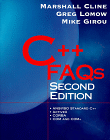
|
C++
FAQs, Second Edition
M. Cline, G. Lomow, and M. Girou
Addison-Wesley, 1998
Derived from the FAQ list for the comp.lang.c++
newsgroup, this book will answer many of your questions about
C++. |
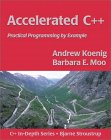
|
Accelerated
C++: Practical Programming by Example
A. Koenig and B. E. Moo
Addison-Wesley, 2000
Takes a new approach to teaching C++, covering
relatively sophisticated language constructs (such as templates)
early, so that the reader can tackle realistic programs sooner.
Like Lippman's Essential C++ (see below), this book is
fast-paced and aimed for readers who are already skilled in another
language. For that audience, though, I recommend it highly. |
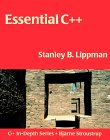
|
Essential
C++
S. B. Lippman
Addison-Wesley, 2000
If the length of C++ Primer (see
below) seems too intimidating, try this brief introduction to
C++. It's highly condensed (only seven chapters, totaling 204
pages, plus appendices), so don't expect lengthy explanations
or lots of examples. Recommended only for experienced programmers. |
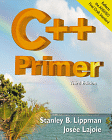
|
C++
Primer, Third Edition
S. B. Lippman and J. Lajoie
Addison-Wesley, 1998
Probably the best bet for learning Standard
C++. Lajoie chaired the core language working group of the C++
standards committee, so she knows her stuff. The book's organization
is a bit eccentric, and it's long (1237 pages), but this is the
book I turn to the most when I have a C++ question. |
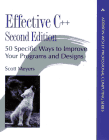 |
Effective
C++: 50 Specific Ways to Improve Your Programs and Designs, Second
Edition
S. Meyers
Addison-Wesley, 1998
Once you've learned the basics of C++,
Meyers will help you improve your code. The book's organization
into fifty separate lessons makes it perfect bathroom reading! |
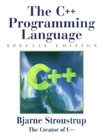 |
The
C++ Programming Language, Special Edition
B. Stroustrup
Addison-Wesley, 2000
Stroustrup is the designer of C++, so this
book is a must-have for any serious C++ programmer. There's no
better way to gain an understanding of how C++ was designed to
be used. The book isn't perfect, however. In particular, the
design and index are poor, and it's hard to use as a reference. |
 |
The
Design and Evolution of C++
B. Stroustrup
Addison-Wesley, 1994
If you're curious about the often quirky
features of C++ and how they came to be that way, you'll enjoy
reading Stroustrup's account of the language's evolution. Along
the way, you'll arrive at a better understanding of the problems
that those features are designed to solve. |
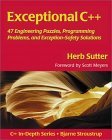
|
Exceptional
C++: 47 Engineering Puzzles, Programming Problems, and Solutions
H. Sutter
Addison-Wesley, 2000
Reading this book is a good way to see
if you really understand C++. Structured in the form of
47 "items" (questions to the reader, often in the form
of "what's wrong with the following code?"), the book
delves into the subtleties of C++ with gusto. Even if you have
no idea how to answer the questions that are posed, you'll learn
a lot by reading the answers. |
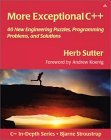
|
More
Exceptional C++: 40 New Engineering Puzzles, Programming Problems,
and Solutions
H. Sutter
Addison-Wesley, 2002
The sequel to Sutter's popular Exceptional
C++, this book is written with the same care and insight
as the original. |
Click on the cover art or title to see
each book's description at Amazon.com. To see lists of best-selling
C and C++ books at Amazon.com, click on the Amazon logo below.
 |